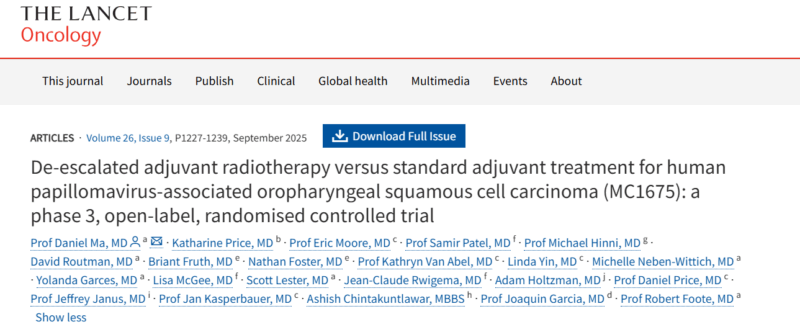Moawia Mohammed Ali Elhassan, Associate Professor at University of Gezira, shared on LinkedIn about a recent paper by Daniel Ma et al. published on The Lancet Oncology:
“De-escalation in HPV-Associated Oropharyngeal Cancer: A New Paradigm?
A recent Phase III RCT published in The Lancet Oncology presents a compelling case for de-escalated adjuvant hashtag#radiotherapy in the treatment of HPV-associated oropharyngeal SCC.
The study compared a de-escalated regimen
(30–36 Gy in 1·5–1·8 Gy fractions twice per day over 2 weeks plus docetaxel 15 mg/m2 on days 1 and 8 of treatment) against standard of care (60 Gy in 2 Gy fractions once daily over 6 weeks plus cisplatin 40 mg/m2 once a week).
The results are significant:
- Reduced Toxicity: The de-escalated group showed a cumulative chronic grade 3 or higher toxicity rate of just 3%, a marked improvement over the 11% seen in the standard of care group (p=0.042).
- Improved Quality of Life: This reduction in toxicity directly translates to a better patient experience, with a lower rate of long-term side effects like dysphagia & the need for feeding tubes.
In conclusion, de-escalated adjuvant RT proved to be a more tolerable treatment with significantly less cumulative grade 3 or higher chronic toxicity compared to standard of care. Further clinical trials are warranted to explore indications for this regimen.”
Title: De-escalated adjuvant radiotherapy versus standard adjuvant treatment for human papillomavirus-associated oropharyngeal squamous cell carcinoma (MC1675): a phase 3, open-label, randomised controlled trial
Authors: Daniel Ma, Katharine Price, Eric Moore, Samir Patel, Michael Hinni, David Routman, Briant Fruth, Nathan Foster, Kathryn Van Abel, Linda Yin, Michelle Neben-Wittich, Yolanda Garces, Lisa McGee, Scott Lester, Jean-Claude Rwigema, Adam Holtzman, Daniel Price, Jeffrey Janus, Jan Kasperbauer, Ashish Chintakuntlawar, Joaquin Garcia, Robert Foote

More insights from Moawia Mohammed Ali Elhassan.


